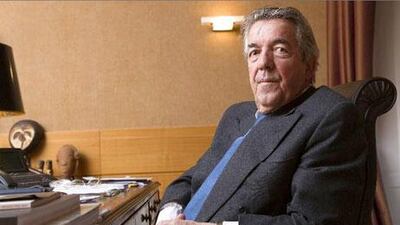Known as the "dictator hunter," Enrico Monfrini of Monfrini Crettol & Partners in Switzerland rose to prominence for tracking down the assets of the late Sani Abacha, the former Nigerian overlord.
Since being hired by the Nigerian government in 1999, he has recovered more than US$1.3 billion (Dh4.77bn) of Abacha's foreign assets. In the process, he developed investigative and legal techniques that are expected to help speed up the job of finding and bringing back billions of dollars of former regime assets of Tunisia, Egypt and other Middle Eastern and North African (Mena) countries.
You started working on the Abacha case in 1999, and there is still another $1bn to recover. Is returning the proceeds of corruption in parts of the Mena region going to be a similarly daunting task?
One can say this Abacha case paved the way for these new countries to become more successful and go faster. In the Abacha case the political problem was much bigger because there was no political will to go ahead with this case. I had to force the doors in Switzerland and other countries. Many countries did not have laws allowing any confiscation, and there are still countries that do not have laws allowing confiscation. But the case forced countries to instal laws and improve money-laundering restrictions.
We're hearing a lot about Switzerland and other jurisdictions freezing the assets of Syrian, Egyptian, Tunisian and Libyan officials. How effective are these freezes in cutting off former dictators from their funds?
The freezes are theoretical. You have to trace the assets, and you need to be able to trace them with a paper trail. I know where to go to find money, and I know who to ask to find money. When there's a theoretical freezing order, banks check their books to find money belonging to [say] Mr Ben Ali and Mr Mubarak and find that they don't have any. But maybe they're wrong and they do have some, because others are holding money on behalf of these people or they create structures where wives, ministers or others have the money and their names never appear.
Given the lengths to which dictators often go to hide their money, won't finding it be difficult?
I've learnt all the ways used by professional money-launderers. I know their profile. I know the way they operate. If there is a political will, finding the money is not an issue. With the political will, you can find the money and you have no choice but to induce the courts and legal systems to act fast. Frozen accounts talk. Frozen accounts where I can see the ins and outs for the past 10 years will say where it came from and where it went to, and it gathers like a snowball.
What proportion of former regimes' funds should countries expect or hope to recover? What would you consider a successful effort in bringing money back?
Getting anything back is a huge success. There's a symbolic element that's very important. Not everything is money. The people want [dictators] to be punished, and there are two ways to punish people: take money away from them; and put them in jail.
What should the international community do to make your work easier?
We need to lobby. I don't believe too much in the UN in this respect. The UN is quite lame because they have to be polite with all their members. Organisations like the G8 and G20 are much more official, and if there is a clear will from the western world or rich emerging countries to fight against corruption, make it a main point of their political agenda and put pressure on other countries, it can take place and it will take place. These cases like [Muammar] Qaddafi and [Mr] Mubarak and [Mr] Ben Ali will open a lot of discussions.
Are you working for any of the interim governments in Tunisia or Egypt?
I can't say. It's confidential.

